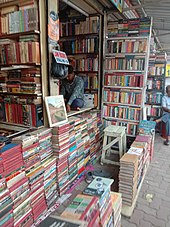Bookselling



Bookselling is the commercial trading of books which is the retail and distribution end of the publishing process.[1]
People who engage in bookselling are called booksellers, bookdealers, bookpeople, bookmen, or bookwomen. The founding of libraries in c. 300 BC stimulated the energies of the Athenian booksellers.
History[edit]
In Rome, toward the end of the republic, it became the fashion to have a library, and Roman booksellers carried on a flourishing trade.[2]
The spread of Christianity naturally created a great demand for copies of the Gospels, other sacred books, and later on for missals and other devotional volumes for both church and private use.[3] The modern system of bookselling dates from soon after the introduction of printing. During the 16th and 17th centuries, the Low Countries, for a time, became the chief centre of the bookselling world. Modern book selling has changed dramatically with the advent of the Internet. Major websites such as Amazon, eBay, and other big book distributors offer affiliate programs and dominate book sales.
Modern era[edit]



Bookstores (called bookshops in the United Kingdom, Ireland, Australia and most of the Commonwealth, apart from Canada) may be either part of a chain, or local independent bookstores. Stores can range in size, offering several hundred to several hundred thousand titles. They may be brick and mortar stores, internet-only stores, or a combination of both. Sizes for the larger bookstores exceed half a million titles. Bookstores often sell other printed matter besides books, such as newspapers, magazines, and maps; additional product lines may vary enormously, particularly among independent bookstores. Colleges and universities often have bookstores on campus that focus on providing course textbooks and scholarly books and also sell other supplies and logo merchandise. Many on-campus bookstores are owned or operated by large commercial chains such as WHSmith, Blackwell's or Waterstone's in the United Kingdom, or Barnes & Noble College Booksellers in the United States.

Another common type of bookstore is the used bookstore or second-hand bookshop which buys and sells used and out-of-print books in a variety of conditions.[4][5] A range of titles are available in used bookstores, including in print and out-of-print books. Book collectors tend to frequent used bookstores. Large online bookstores offer used books for sale, too. Individuals wishing to sell their used books using online bookstores agree to terms outlined by the bookstore(s): paying the online bookstore(s) a predetermined commission once the books have sold. In Paris, the Bouquinistes are antiquarian and used booksellers who have had outdoor stalls and boxes along both sides of the Seine for hundreds of years, regulated by law since the 1850s and contributing to the scenic ambiance of the city.[6][7]
Book sales[edit]
Unit sales of print books in the United States were down 2.6 percent in 2023 compared to 2022, but print sales in 2023 were up 10 percent compared to 2019.[8]
See also[edit]
- Book store shoplifting
- Bookstore tourism
- History of books
- Independent bookstore
- List of independent bookstores
- Quarter bin
Notes and references[edit]
- ^ Centre for Economics and Business Research, Bookselling Britain: The economic contributions to - and impacts on - the economy of the UK's bookselling sector: A report for tve Booksellers Association, p12
- ^ Dix, T. Keith (1994). ""Public Libraries" in Ancient Rome: Ideology and Reality". Libraries & Culture. 29 (3). University of Texas Press: 282–296. JSTOR 25542662.
- ^ Kenyon, Frederic G. (1 October 2011). Our Bible and the Ancient Manuscripts. Wipf and Stock Publishers. p. 101. ISBN 9781610977562.
- ^ Brown, Richard & Brett, Stanley. The London Bookshop. Pinner, Middlesex: Private Libraries Association, 1977 ISBN 0-900002-23-9
- ^ Chambers, David. English Country Bookshops. Pinner, Middlesex: Private Libraries Association, 2010 ISBN 978-0-900002-18-2
- ^ "The Bouquinistes of Paris". Atlas Obscura. Retrieved 2022-05-01.
- ^ Les Cahiers français (Issues 13-24) (in French). La Documentation Française. 1957. p. 30.
- ^ Milliot, Jim (2024-01-05). "Print Book Sales Fell 2.6% in 2023". Publishers Weekly. PWxyz, LLC. Retrieved 2024-01-10.
Further reading[edit]
- Amory, H., & Hall, D. D. (2005). Bibliography and the book trades: studies in the print culture of early New England. University of Pennsylvania Press.
- Davis, Joshua Clark, "Una Mulzac, Black Woman Booksellers, and Pan-Africanism", AAIHS, September 19, 2016.
- Lister, Anthony, 'William Ford: the Universal Bookseller' The Book Collector 38 (1989):343-371.
- Thomas, Alan G. (1979). "Solomon Pottesman."The Book Collector 28 no 4:545-553.
